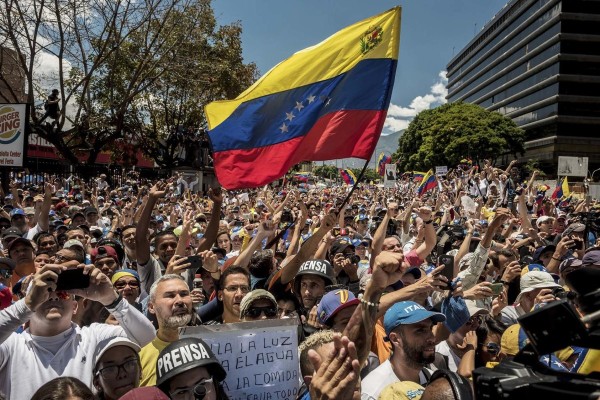Red Ballot: Voting for Revolution in Venezuela
As early as 3am on Sunday, August 15th, Venezuelans started camping outside schools and public buildings, waiting hours to cast their vote in a referendum to decide not only the future of President Hugo Chávez, but also of the Bolivarian revolution that he has spearheaded. Despite the lines and the heat, the mood was almost universally festive.
The result was a remarkable mobilization amongst the poor that countered global trends towards reduced electoral participation and reflected a deepening of democracy beyond mere representation. This mobilization was itself a reflection of Chavez’s decision not only to campaign against neoliberalism electorally but actually to govern against neoliberalism.
At 4:05 in the morning, August 16th, 2004, Venezuela’s National Electoral Committee (CNE) announced the referendum result: “4.2 million or 41.5 per cent of Venezuelans voted ‘Yes’ to Chávez’s recall, while a clear majority of 5.9 million or 58.4 per cent voted ‘No.’”
The streets erupted in celebration.
How do we explain this result? A report in the August 14, 2004 edition of The Economist goes some of the way to answering this question. The report compares responses between the mid-nineties and the present to the question whether “Democracy is preferable to any other kind of government” (for the full report, see www.latinobarometro. org). Among all the 17 countries surveyed, it is Venezuela that has seen the fastest growth in support for democracy since the mid-nineties.
The most important reason for these results is that the Chávez government has bucked the trend in Latin America, breaking with the previous two decades of neoliberal political and economic policy.
Chávez and his Bolívarian revolution have made a commitment to radically increasing social investment at a time when social spending is being cut everywhere else in the region. Moreover, Chávez has not only expressed his resistance to the neoliberal project (something imitated in Argentina and Brazil), but (unlike Argentina and Brazil), he has actually begun to offer an alternative.
Though still in the developmental stages, the Bolivarian Alternative for Latin America and the Caribbean (ALBA) points to a different model of regional integration. In this sense, it opposes itself to the dominant model spearheaded by the U.S., the Free Trade Area of the Americas (FTAA). According to the official website of the Bolivarian alternative, “while the FTAA responds solely to the interests of transnational capital, the ALBA emphasizes the struggle against poverty and social exclusion.”
Inside Venezuela, this orientation is complemented by a variety of social projects launched since 1998 designed to address the many facets of Venezuelan poverty: free, accessible, and universal healthcare, education, child-care, employment, and community organization.
Moreover, behind the increase in electoral participation is the recent expansion of the democratic system itself. With an ongoing process of power decentralization, the Bolivarian revolution has begun making the Venezuelan people the protagonists in their own political life. Though this development is still in the early stages and many serious barriers to its successful and transformative implementation remain, it has drawn many Venezuelans into a political system that had previously consciously excluded them.
The Next Step
By consolidating the legitimacy of the Chávez government, the referendum victory has ushered in a new stage in the “Bolivarian Revolutionæ–a stage that will raise new challenges and new potentials. The opposition is imploding, and to avoid being buried with them, their allies in the U.S., in the international private media, and influential NGOs have all jumped ship. For the first time since first coming to power in 1998, Chávez has some room to manoeuvre.
Though international capital, the media, and the US have recognized Chávez’s victory, this is no recognition of weakness on their part. They are waiting to see if he will fade into the kind of malleable populist that they can deal with, trading inflammatory rhetoric for backroom deals with neoliberalism.
To ensure that he does not, the Bolivarian revolution needs to be deepened. The international left can play a concrete role here. By offering its critical support, the international left can be part of the battle for Venezuela as it moves beyond the confines of its own borders, and prepares to explode onto the global scene. To do this, the left must move past its reservations and admit that today Venezuela represents the frontier of the struggle against neoliberalism.
Jonah Gindin is a Canadian journalist living and working in Caracas, Venezuela. He writes regularly for www.venezuelanalysis.com
This article appeared in the September/October 2004 issue of Canadian Dimension .










